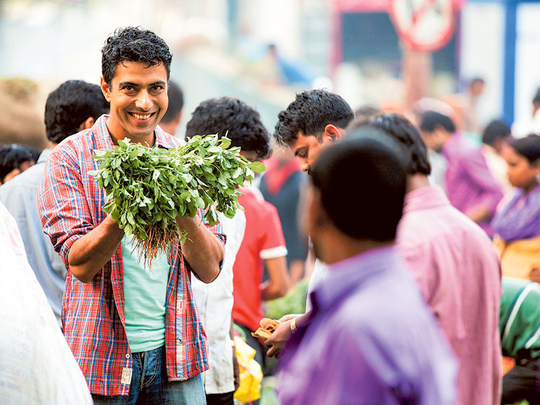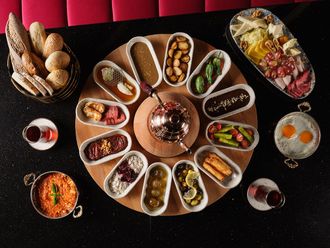
Sometime in the past three years you might have seen him on Indian TV — on shows such as The Great Indian Rasoi — but he’s the “new kid on the block” on MasterChef’s Indian franchise, which is at present in its fourth season.
“I’ve done travel shows, instructional shows but [MasterChef India] is meeting people real time, reacting to them real time,” said the Lucknow-born 37-year-old globetrotting chef who has 24 restaurants in four countries to his credit, including the Indo-French flagship Banq in Boston, US.
“Even on travel shows, we go to restaurants with established reputations and seasoned chefs. Here you are face to face with the amateur Indian cook. That’s the beauty of the show. It also cleared a huge misconception of mine. I’ve grown up with artisans, living with them, so I’ve always held them in a certain regard. I won’t say there’s disrespect for the Indian home cook but I was never exposed to that. Even in a semi-urban Indian family, you will find a maid. And once you meet these people, you realise they cook purely out of passion or love for the family.
“There’s one contestant named Nikhita from Abu Dhabi. She’s 21, never gone to a culinary school because she’s vegetarian, yet has a YouTube channel. The kind of baking she does can give any professional a run for their money. When you see that, it’s very gratifying.
“It’s been three years since I returned to India after being away for seven years. The globalisation and the exposure that has suddenly swarmed India in the last decade is astounding. In that aspect, you feel good being on TV because somewhere you feel you’ve made a contribution.
“Food is our bread and butter — it’s taken us where we are. So, there’s always merit in the contestants’ efforts and we try and see that. As a judge, we owe to the viewer to be fair because they spend a good amount watching us. At the same time because we are different people, who’ve grown up in different environment, that respect and fairness comes across differently.”
Unlike most chefs who’d credit their mothers for their culinary excellence, Brar, who became the youngest executive chef in India at 25 at the Claridges Hotel in New Delhi, was actually a rebel. Fresh out of high school, Brar refused to adhere to the norm and become an engineer or a doctor but followed a dream he did not even know existed at the time.
“Yes, it upsets my mother,” laughed Brar. “Whatever I am today is because of Muneer Ahmed. He made the difference in my life. For someone who can make you carry coal three storeys, pound spices and bhuno [sauté] masala in your sleep and yet convince you that this is your calling is his credit, not mine.
“I’d already been interested in eating, exploring street food and had built a certain sense of appreciation for food. So that was the ‘comfort’ I sought, much against my parents’ wishes. Obviously I had no idea or inclination then that I would one day be a known chef. I was 17 when I ran away from home. I stayed with Muneer Ustad who was popular for the kakori kebabs he made on a food-cart. Unlike other vendors who never spoke about their recipes or techniques, Muneer would tell us about making good food. I learnt more by watching because he made me do more manual labour than actual cooking. But it got me to take the first step in the right direction.
“A year later my parents too understood this was my calling. However, I made sure that they did not feel disappointed in their son. I sat for all entrance exams, including NDA [National Defence Academy] and was selected. But I had made my choice and joined hotel management.”
In a report earlier this year, research was done on what made Indian food tasty. Chefs such as himself, Vikas Anand, Atul Kochhar, Vineet Bhatia, Sanjeev Kapoor, Gaggan Anand — to name a few — contemporising Indian cuisine, Brar feels “Indian food” is a misnomer.
“I’ve read that article published in Gulf News,” said Brar, whom we’d met at the Ritz Carlton DIFC, Dubai. “I feel blessed to have travelled, opened 24 restaurants in four countries but all of them with the core of Indian food. But it’s just a scratch on the surface. Firstly, when we say ‘India’ we define political boundaries. Food is an extension of one’s culture and neither food nor culture can be politically divided. For example Bangladesh and Bengal — just because there’s a line drawn on paper, how does its food become different? Food is as much a cultural representation as dance and music.
“Secondly, even within India we divide food politically — Maharashtrian, Gujarati, Punjabi — though it’s definitely changing now. People have started referring to it as Surati or Konkani or Kayastha or Marwari... For the longest time [abroad] Indian food was dal makhani, chicken tikka and naan. That’s the awareness we as chefs need to bring in the world.
“Food is part of culture, culture is evolving, cuisine is evolving but we need to co-relate to that. If you consider it, Punjabi or Mughlai food as we know it is not really Indian. It was brought by the Hindu immigrants from Pakistan at the time of partition. Lahore is politically in Pakistan and happened to be the seat of the Mughals for the longest time.”
Yet Indian chefs tend to create fusion food — or at least tone down the flavours to suit foreign palates — or incorporate new technology, such as molecular gastronomy, which Brar feels shouldn’t prove a dampener.
“My learning from my travels is that taste is objective. If a thing is tasty, it’s universally tasty. Or, just not. If chefs make minor adjustments to Indian food, it’s only fair to give them that leeway because acceptance is the first step to glorification. You have to respect the culture you are cooking in, yes, but you have to respect the palate you are cooking for too and you have to adjust to that palate. I feel it’s all part of evolution.
“Second, when it comes to things such as molecular gastronomy, I feel it will bring back our pride in our food. To a non-Indian it wouldn’t make a difference because he doesn’t know the original taste, but we will appreciate the new take and feel proud that our food can be modern.”
Top box:
“My life lesson is just to be patient and everything will fall in place. Most of what’s happened in my life is not to do with me but good people and the way things happened. So I feel it’s no use stressing over anything. Let things simply happen.”













